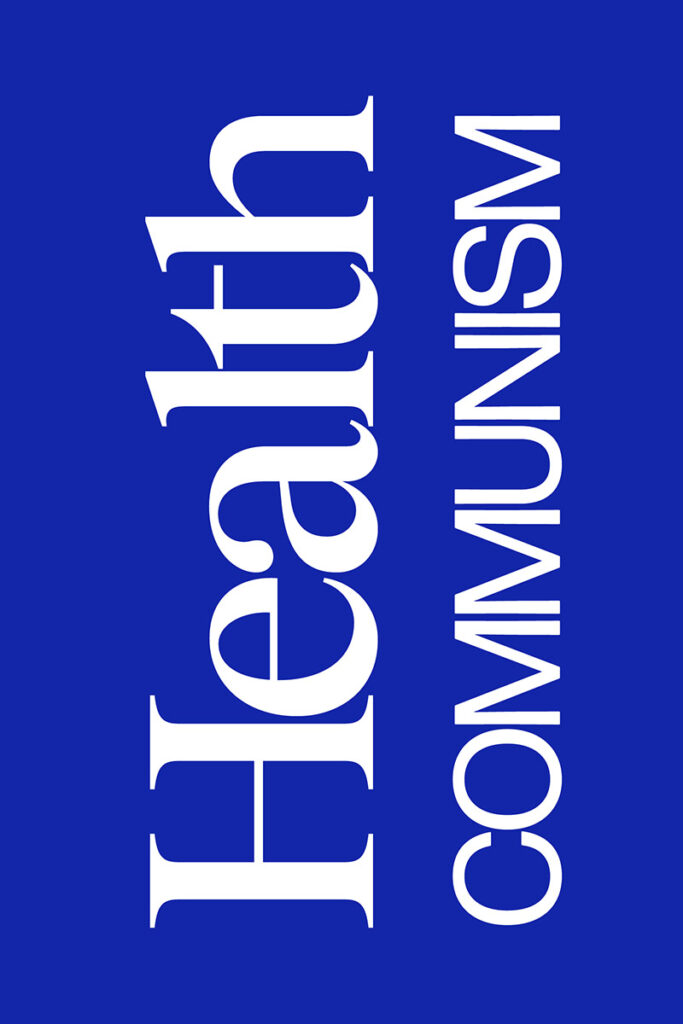
[Verso; 2022]
Reading a manifesto should be like an unveiling. Manifestos, predictably, are in the business of making manifest; something is brought to the stage, something hidden is made visible. And from this revelation emerges a call to action. Sara Ahmed, in her own Killjoy Manifesto, states, “to make something manifest can be enough to cause a disturbance.” A manifesto is a provocation—it doesn’t seek the caveat but makes an unapologetic claim for the solution. Not simply content with cognitive persuasion, a manifesto offers alternative ways of being, alternative ways of doing the world. It draws upon the past to forge imagined futures.
Health Communism, the new work by Beatrice Adler-Bolton and Artie Vierkant, works best as a manifesto: It at once reveals ongoing violence and provokes for change. It is propelled forward by its own imperatives. It not only seeks to evaluate but also to compel, to powerfully make the case for a radical approach to our health. Speaking to two twinned audiences, it shouts aloud that those who seek to improve health must first unhinge it from capital, whilst those seeking to overthrow capital should look to health. Looking across the health sector (whether disability, pharmaceutical companies, or psychiatry), the work suggests how health has always been imbricated with capital, and how capital leans on its own idea of health. It powerfully unroots any “natural” claim to health; rather, it posits that “capitalism has defined health as a capacity to submit oneself to labor.”
Health is not completely ignored in the legacies of communist writing. Engel’s term “social murder” speaks to a longer legacy in communist views of how capital has organized, distributed, and punished through health. But Health Communism recenters health as a core function of capitalist hegemony. The book achieves this “recentralization” around the idea of the “surplus class,” an amorphous category that evades definition. The surplus may contain “the disabled, impaired, sick, mad, or chronically ill,” identified through biocertification, which places them within a waste class separate from the worker. The book’s main activity is outlining how certain social groups are rendered surplus, how they are variously immiserated, exploited, and extracted from.
In Health Communism, health is not simply a contingent sector within capitalism. It is a core part of its construction. The surplus and their distinction from the “worker” are a core means by which capitalism maintains itself. “The idea that the worker is not a part of surplus populations, yet faces constant threat of becoming certified as surplus” is a central tenet in capitalist hegemony. Under the ongoing psychodrama of capitalism, the worker is always precarious, in peril of being certified as surplus.
The outlined oppression is not simply a lament of leftist melancholia. Health Communism thrives with the inbound hope of any manifesto—the naming of violence as a source of potential political revolution. As familiar in Marxism, in the contradictions of capitalism lies possible exploitation for revolutionary ends. Capitalism, in its reliance on health, offers “one of capital’s most critical vulnerabilities,” one that “has been left in plain sight.” It’s up to the revolutionary work to take advantage of this weakness. Throughout the text, Adler-Bolton and Vierkant cite various antagonists to socialized medicine, across industrial eugenicists, proponents of the Red Scare, to Ronald Reagan himself, as they declare it paves the way for dreaded communism. With glee, the authors say, “yes please,” and embrace these fearful prophecies.
Pushing throughout the book is a deep suspicion for any reformers that seek to work within this system. Those who seek to make change whilst placating capital deny the ultimate social condition of health is capitalism itself and are therefore a source of fiery contempt. In one of the more effective and extensive uses of a case-study in the book, looking at the activist response to the AIDS crisis, the authors draw out the various disagreements within the group ACT UP (the AIDS Coalition to Unleash Power). Detailing the split of the Treatment and Data Committee, those seeking for a depoliticized “cure” sought succor with the pharmaceutical industry, such that more progressive political demands “were not only tempered but rolled back, leading to a loss of a robust and radical health justice movement that could have been.” This provocation, that reformist models of change can actively stymie more fundamental changes, is an uncomfortable but compelling challenge for those working in the sector.
In the last couple of chapters, Health Communism embarks upon the narrative history of the Sozialistisches Patientenkollektiv (Socialist Patients’ Collective, or SPK) of Heidelberg. There’s an intrigue in mapping the group’s rise and fall, how it fits in a constellation of 1970s radicalism, alongside figures such as Gilles Deleuze, Felix Guatteri, and Franco Basaglia. The author’s passion and belief in the collective is evident: The book itself is a dedication to the SPK. The group is clearly marked as a forebear, in the sense that the SPK’s “project constitutes the closest direct ideological precursor to what we have termed health communism.” Despite this, these last moments of the book slightly lose the previously compelling pulse. Health Communism works best when it draws upon the forceful energies of the manifesto. But this narrative account remains in the particular intellectual shifts and movements of 1970s radical European leftism and the ever-movable feast of “antipsychiatry.” It remains moored, stuck in its historical framing and at a remove from the contemporary, lacking some of the theoretical push and political force of previous chapters.
Heath Communism is not “well-behaved”: It is not interested in sober consideration, dry pontifications. It thrives through a sense of optimism. There is a joy to a manifesto that sits alongside its anger. If it is birthed from complaint and fury, these emotions are funneled through a hope that things could be otherwise—most of all, an optimism for a new collective. “Malingerers of the world unite,” it calls out, looking for action and looking for community. Seeking to heal the divide between surplus and worker, the book tries to bind these two groups under a new shared goal: to overthrow the capitalist economy of health. After all, Health Communism reminds us, under capital’s steely arrangements, “we are all surplus.”
Jon Venn teaches at the University of Birmingham, UK. His research is about the cultural representations of madness, psychiatry, and suicide. He is the author of Madness in Contemporary British Theatre: Resistances and Representations. He tweets at @jonvenn.
This post may contain affiliate links.







